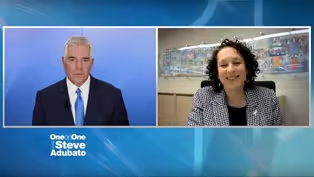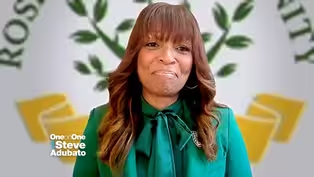One-on-One
Reducing crime and improving public safety in Newark, NJ
Clip: Season 2025 Episode 2841 | 8m 26sVideo has Closed Captions
Reducing crime and improving public safety in Newark, NJ
Steve Adubato talks with Alejandro Giménez Santana, PhD, Executive Director of Newark Public Safety Collaborative and Assistant Professor of Professional Practice at Rutgers University-Newark School of Criminal Justice, about the city’s coordinated efforts to reduce crime and improve public safety in Newark, NJ.
Problems playing video? | Closed Captioning Feedback
Problems playing video? | Closed Captioning Feedback
One-on-One is a local public television program presented by NJ PBS
One-on-One
Reducing crime and improving public safety in Newark, NJ
Clip: Season 2025 Episode 2841 | 8m 26sVideo has Closed Captions
Steve Adubato talks with Alejandro Giménez Santana, PhD, Executive Director of Newark Public Safety Collaborative and Assistant Professor of Professional Practice at Rutgers University-Newark School of Criminal Justice, about the city’s coordinated efforts to reduce crime and improve public safety in Newark, NJ.
Problems playing video? | Closed Captioning Feedback
How to Watch One-on-One
One-on-One is available to stream on pbs.org and the free PBS App, available on iPhone, Apple TV, Android TV, Android smartphones, Amazon Fire TV, Amazon Fire Tablet, Roku, Samsung Smart TV, and Vizio.
Providing Support for PBS.org
Learn Moreabout PBS online sponsorship(upbeat music) - We're now joined by Dr. Alejandro Gimenez Santana, Executive Director of the Newark Public Safety Collaborative and Assistant Professor of Professional Practice at Rutgers University of Newark School of Criminal Justice.
Doctor, good to see you again.
- Good to see you, Steve.
- Okay, talk to us.
2025, where are we in the City of Newark as it relates to crime rates?
- So a lot has happened over the last five years, particularly after the 2020 protests that led to massive changes in policing in the United States and more community engagement.
Today, Newark is a safer city.
We are at a 61 year low in homicides.
Just over 10 years ago, we were over 100.
Now we are just at 28.
Fewer homicides, fewer violent crimes, overall, a safer city, more coordinated in its public safety response.
So I think we have come a long way in over the last few years, and Newark is definitely now a safer city than it was before.
- Alejandro, tell everyone what the Newark Public Safety Collaborative is, because there whole bunch of folks involved looking to deal with crime in the City of Newark.
- Yes, so the Newark Public Safety Collaborative was created in 2018 out of Rutgers-Newark and the School of Criminal Justice.
The work that we do really is to create pathways between academic research and evidence and what the community can do to empower themselves and become co-producers of public safety.
We work within a large ecosystem of organizations led by both the mayor's office as well as stakeholders across different nonprofits that provide essential services to reduce crime, deter crime in places that had had, you know, chronic problems for years.
And we've seen spectacular reductions in crime since we started.
Thanks to, again, to this ecosystem of organizations that are working alongside the police department to reduce crime.
- Dr., what's the role of lighting?
I mean, someone says, "What does lighting have to do with crime?"
How do you respond?
- That's a great question.
So back at the beginning of the creation of NPSC, through a collaboration with PSE&G at the local utility company, we found an opportunity to prove something that evidence shows that works and that Newark has proved that it works as well, is how to improve lighting conditions in areas where there's increased levels of nighttime violent crime.
What we did is a collaboration where we matched crime records, so past crime, with locations where there were opportunities to change lighting or brighter and more efficient LED lights.
And what we found after almost 2,500 lights were changed is that the effect of lighting on crime is statistically significant.
In other words, it does reduce opportunity, it does help to reduce crime.
And we saw that over six months after those lights were changed, there were strong reductions, over 40% reduction in nighttime violent crime in the areas of the city where those lights were changed.
- Let's deal with this because there are crime rates, crime statistics, and then there's perception of crime.
Because if you ask most folks, what's your perception of crime in the City of Newark?
I anecdotally, I mean, I'd be shocked if people said, "Wow, I'm thinking crime rates are down in Newark."
That is not the perception.
Not just in Newark, but in cities across the east coast, city across the country, and urban communities the perception is crime rates are, quote, "through the roof."
- Mm-mm.
But that's not supported by current evidence.
What we are seeing, again is that- - Why do you think it is?
Why do you think the perception does not match the, quote, "statistics"?
- Because sometimes what people perceive is their immediate environment.
Sometimes there's quality of life issues that haven't been addressed that can be created in the perception that current conditions are heightened, and that can still perpetuate those perceptions.
I will say a problem that we are seeing now is more the under-reported, so crime statistics and crime data that we receive from the police department are not always the full picture.
We know that we are missing some data, particularly the more you move toward property crimes.
Violent crimes are well reported, same for auto theft because of insurance reasons, but other crime types are just not well reported, and particularly I'll mention domestic violence.
Domestic violence is a crime that is very under-reported and we've seen a trend over the last five months, but particularly, actually since January, where we've seen reductions in reported domestic violence, which we think are associated with, for example, the current federal administration and its practices, or it's tougher enforcement on the immigrant community.
- Okay, since you mentioned the federal government, talk to us about federal funding cuts to urban communities like Newark as it relates to crime reduction.
Has there been any direct- Have there been any direct cuts to crime prevention in the City of Newark?
And if so, where are they?
- Yes, several nonprofits have seen their budgets reduced dramatically over, and this happened about two, three weeks ago when they received letters of termination of their grants from the Bureau Justice Assistance, which is part of the Department of Justice.
These grants were supporting community responses, very much the work that we've been doing over the last five years to help the community be co-producers of public safety.
There's dozens of organizations, not just in Newark, but across the country, that have seen those close to $800 million evaporated from one day to the next, and that is- - What would be the motive to do that?
If everyone wants to reduce crime, particularly in urban communities where it is an issue, it's an issue everywhere, but what would be the policy logic to that?
- I cannot speak to the policy logic because I do think that- - Do you think the administration understands the implications, the impact of those cuts?
- That's where I think there's maybe a gap in misunderstanding about bipartisan support on these policies because I do think that evidence has shown that these responses work and that they should be continued, they should be maintained.
So I think there's a lack of understanding of the importance of helping first, that these policies, these grants, these funding was supporting alternative responses to law enforcement.
The community, we're working with the police in finding ways that fill the gap that the police sometimes feel powerless to feel.
I'm thinking, I'm talking about problems with homelessness, problems with mental health, problems of domestic violence.
The police are just not equipped to deal with some of these situations, that this is where the community comes in, this is where the high risk intervention groups come in, the violence interrupters.
And that's why it's so important, these funding, because it has been supporting the police in those functions where they're just not well equipped to deal with these situations.
- Next time we have you back, I wanna talk about the perception on the part of many that those who are here illegally, undocumented citizens, are disproportionately impacting crime rates.
Let's have that discussion next time.
Doctor, thank you so much for joining us.
We appreciate it.
- Thank you so much, Steve.
Thank you.
- Let me also remind folks that Rutgers-Newark is a higher ed partner of ours.
Doctor, thank you so much.
I'm Steve Adubato, thank you for watching.
We will see you next time.
- [Narrator] One-On-One with Steve Adubato is a production of the Caucus Educational Corporation.
Funding has been provided by PSE&G.
RWJBarnabas Health.
Let’s be healthy together.
The Fidelco Group.
The Port Authority of New York and New Jersey.
The North Ward Center.
Community FoodBank of New Jersey.
United Airlines.
Congress Hall.
A Cape Resorts property.
And by NJ Best, New Jersey’s five-two-nine college savings plan.
Promotional support provided by BestofNJ.com.
And by ROI-NJ.
- I’m very grateful that I’m still here.
- That’s me and my daughter when we went to celebrate our first anniversary.
- With a new kidney I have strength.
- They gave me a new lease on life.
- I’m still going everywhere and exploring new places.
- Nobody thought I was going to be here, nobody.
- I look forward to getting older with my wife, that’s possible now.
- [Narrator] We’re transforming lives through innovative kidney treatments, living donor programs, and world renowned care at two of New Jersey’s premiere hospitals.
- They gave me my normal life back.
It’s a blessing.
- [Narrator] RWJBarnabas Health.
Let’s be healthy together.
How The Russell Berrie Foundation recognizes leaders in NJ
Video has Closed Captions
Clip: S2025 Ep2841 | 9m 51s | How The Russell Berrie Foundation recognizes leaders in NJ (9m 51s)
The importance of social emotional learning & wellness
Video has Closed Captions
Clip: S2025 Ep2841 | 10m 10s | The importance of social emotional learning & wellness (10m 10s)
Providing Support for PBS.org
Learn Moreabout PBS online sponsorship
- News and Public Affairs

Top journalists deliver compelling original analysis of the hour's headlines.

- News and Public Affairs

FRONTLINE is investigative journalism that questions, explains and changes our world.












Support for PBS provided by:
One-on-One is a local public television program presented by NJ PBS

